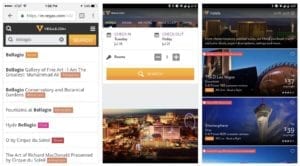Sin City Planning Gets Even Speedier With Search
Vegas.com offers the best of Las Vegas’s hotels, attractions, entertainment, and nightlife from a single online interface. The site serves 2.3 million users every month, helping them create a customized itinerary for a Vegas experience that is uniquely theirs. As a publicly-owned travel agency, Vegas.com focuses on the direct-to-consumer market for Las Vegas tourism.
With half of the site’s user base mobile driven, offering the best experience becomes key to increasing conversions. The mobile site was lacking full scale search, and as a result, users were taking a very linear path to book parts of their trip—usually one product at a time. Without search, the end user had to input the dates of their trip then navigate through categories and lists to drill down to the exact attraction or show they were wanting to purchase. For users who knew what they wanted, the process was too time intensive— especially for in-market users trying to make a quick decision.
In order to keep users’ attention, Vegas.com needed a speedy, relevant, and easy to use mobile search to deliver the smoothest possible experience.
“We have a hyper-focus on performance,” said Paul Mello, Director of Special Projects at Vegas.com. “Fusion gave us a complete platform for delivering fast, scalable search, with many of the capabilities we needed out-of-the-box, ready to use.”
One of the most important features Fusion added to the mobile site was full-text search. Users who knew exactly what they wanted could zero in on it and get into the purchase flow quickly, avoiding the previously time-intensive booking path. With Fusion’s foundation built on Apache Solr, the team knew the search app could handle both the volume of queries the site experiences as well as serve up relevant results back to the user in a fraction of a second.
Another important capability in the search was query pipelines. With this feature, the team was now able to boost a particular product based on season or current trends, seeing the results live in the search results instantly. So if a performer announces a Vegas show today, it will bubble up to the top of searches, even if the event doesn’t happen for several months.

Query pipelines were also used for the auto-suggest feature and for submitted searches—along with some rules for boosting particular results.
Lastly, signal capture was a feature that enabled the mobile site to capture user behavior, aggregate it and apply it to search results as personalized recommendations. The mobile site logs every link a user clicks on, each query that comes in, and time spent on pages to constantly fine-tune the search experience for maximum relevancy.
Once the search app had been built, the team began A /B testing the mobile experience. Some users would see the new mobile search interface while others would see the existing design without search. The team found that users that utilized the search app were converting at a higher rate than users that were presented the conventional interface. 8% of users on the mobile site took advantage of search resulting in 12-15% of the site’s overall conversions.
“Fusion helped us create a relevant, responsive, mobile search experience that reduced friction and increased conversions,” said Mello. “We’ve since built a new desktop search experience that replaced our existing desktop search appliance with a more efficient and powerful search.”